@hifijim
In this case it's more about knowing and understanding the limits and boundaries.
You leave a bit of performance on the table by limiting the system by the PR excursion (again in theory).
Since the woofer has the potential to do (a bit) more.
There is no right or wrong in that.
Like you correctly said, each system, design and idea has its own set of limits.
If you tink you will still have plenty of performance left, it's still fine choice! 🙂
In this case it's more about knowing and understanding the limits and boundaries.
You leave a bit of performance on the table by limiting the system by the PR excursion (again in theory).
Since the woofer has the potential to do (a bit) more.
There is no right or wrong in that.
Like you correctly said, each system, design and idea has its own set of limits.
If you tink you will still have plenty of performance left, it's still fine choice! 🙂
About passive woofers as reflex resonators... I can't remember seeing nearfield measurements, only simulations that miss all resonances and "midrange leakage".
It is difficult for me to accept that they would be problem-free
I happen to have a 10" sub with a passive radiator of same size with added mass. Both have pulp cone, Peerless XLS10. I have nearfield measurements below, not pretty at all... Measured indoors, so gp includes room effects. No xo or eq used. Added mass was per construction plans, obviously way too much...


It is raining today, so away with added mass and new measurements!
It is difficult for me to accept that they would be problem-free
I happen to have a 10" sub with a passive radiator of same size with added mass. Both have pulp cone, Peerless XLS10. I have nearfield measurements below, not pretty at all... Measured indoors, so gp includes room effects. No xo or eq used. Added mass was per construction plans, obviously way too much...
It is raining today, so away with added mass and new measurements!
Last edited:
A lot of midrange coming from that PR… and tuning could be better I presume. Did you plan to post some broadband burst decay plots from the passive?
Interesting, @Juhazi!
The PR is tuned very low, so also the resonance peak/output is rather low.
How far is the driver from the PR? Depending on that distance there will be a considerable amount of sound bleeding over from the driver!
55-65 Hz seems to be a room resonance.
240 Hz probably an enclosure resonance?
The PR is tuned very low, so also the resonance peak/output is rather low.
How far is the driver from the PR? Depending on that distance there will be a considerable amount of sound bleeding over from the driver!
55-65 Hz seems to be a room resonance.
240 Hz probably an enclosure resonance?
From REW, same sweeps as above
If I remember right, my net volume 40ltr 24mm MDF box doesn't have any filling but many braces also between drivers, because it's a sub with roughly 80Hz lowpass. But it is really heavyweight about 50kg. Both drivers are on facial side, centers distance 50cm. Hypex 2.1 amp on the backside in own chamber. I made this perhaps in 2010, didn't have a mic then.
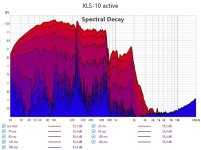
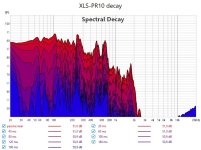

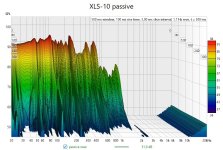
If I remember right, my net volume 40ltr 24mm MDF box doesn't have any filling but many braces also between drivers, because it's a sub with roughly 80Hz lowpass. But it is really heavyweight about 50kg. Both drivers are on facial side, centers distance 50cm. Hypex 2.1 amp on the backside in own chamber. I made this perhaps in 2010, didn't have a mic then.




Last edited:
My house will be less populated in the afternoon, I can see what no added mass and filling will do. I can take some photos too for record.
I have quietly planned about buying a second active driver (NLA) or blocking the opening of the passive, but that will not happen today.
I have quietly planned about buying a second active driver (NLA) or blocking the opening of the passive, but that will not happen today.
You beat me to it, I was literally gonna ask and suggest this in @stv port topic.About passive woofers as reflex resonators... I can't remember seeing nearfield measurements, only simulations that miss all resonances and "midrange leakage".
I have never seen proper measurements as well.
Although Erin has done a few with his Klippel system.
It's very hard to investigate this, because there can be a lot of bleed through from the outside of the cabinet.
So I am also not so sure that what you're measuring is just pure coming from the PR?
Leaking trough the PR would suggest that we are left with a sort of dipole or cardioid mix.
So I think that would be my point of attack, to see if we get any (deep) nulls in the response somewhere.
Or any other weird summing/canceling behavior.
Btw, PR's already have another issue.
Just like woofers, they can suffer from a not so linear Kms(x).
Which in this case would shift the tuning.
Can you please show the burst decay of the waterfall plots in periods?From REW, same sweeps as above
If I remember right, my net volume 40ltr 24mm MDF box doesn't have any filling but many braces also between drivers, because it's a sub with roughly 80Hz lowpass. But it is really heavyweight about 50kg. Both drivers are on facial side, centers distance 50cm. Hypex 2.1 amp on the backside in own chamber. I made this perhaps in 2010, didn't have a mic then.
View attachment 1328575View attachment 1328578
View attachment 1328576View attachment 1328577
We can't see much this way unfortunately.
I would be surprised if one finds an useable (phase) relationship between the CD woofer measurement and that of the PR. And assuming no cone breakup up to about 400-500Hz, the CD measured signal likely originated from the cone of the PR, other sources would be too far away to have major contributions.Leaking trough the PR would suggest that we are left with a sort of dipole or cardioid mix.
Interesting, this!
Not sure if I am following you.I would be surprised if one finds an useable (phase) relationship between the CD woofer measurement and that of the PR. And assuming no cone breakup up to about 400-500Hz, the CD measured signal likely originated from the cone of the PR, other sources would be too far away to have major contributions.
Interesting, this!
But let me jus explain a bit myself.
The woofer obviously has a backwave.
So in a open baffle system this will result in a dipole.
When there is enough damping material behind it, it will result in a cardioid.
Mostly because of the delay as well as a attenuation of the signal.
The cone of a PR probably isn't acoustically completely closed off.
So some part of the backwave could be coming through.
Probably resulting in the mix of the two above.
We are obviously talking way above the low-end frequencies here.
I am not sure where that limit between pure low-end "pressure" and "backwave" practically speaking is?
Or where any of the limits are in general?
Like difference and thickness of the cone material etc etc.
I hate that word 😛. You are right, I think. But I think also this: the enclosure obviously has modal resonances. I can think a few that would hit the PR real hard and transmit.The woofer obviously has a backwave.
Oh right you're thinking about internal resonances (standing waves).But I think also this: the enclosure obviously has modal resonances. I can think a few that would hit the PR real hard and transmit.
Well those shouldn't be there to begin with, since they will also come out at the front 😉
That being said, it opens another question, since we now don't have a situation anymore with a "pipe" enclosure with one open end, but two open ends.
Which changes the modes.
Again, all in theory, I have no idea how this practically works.
In this sense, a port is a bit easier, since we only have to pay attention to the entrance of the port.
Meaning we can route it to a more convenient place (purely simplified).
With a PR we have to leave a relative big area open (ideally the same as the Sd) to be sure we don't butcher the resistance and losses (= Q-factor) of the system.
This is one of the reasons why I always like to design a cabinet in such a way that the first mode is above my crossover point.
What is wrong with the word backwave btw?
Well, what defines a ‘wave’? To me one better refrains to the actual sound pressure in a multiple of points within the loudspeaker enclosure, with SPL at any point built up by the contribution of all real and ‘virtual’ sound sources. Put it in the well-known ripple tank simulator and finding the backwave becomes quite complicated.
Poorly designed bass reflex and passive radiator speakers sound bad, well designed ones sound good. I don't see you building a poorly designed speaker so I think these will turn out quite nice... Perhaps my hopes of avoiding midrange leakage and pipe resonances will be dashed...
I know, but something like opposite phase back radiation is such a mouthful.Well, what defines a ‘wave’? To me one better refrains to the actual sound pressure in a multiple of points within the loudspeaker enclosure, with SPL at any point built up by the contribution of all real and ‘virtual’ sound sources. Put it in the well-known ripple tank simulator and finding the backwave becomes quite complicated.
This can be predicted pretty well beforehand to be honest.Perhaps my hopes of avoiding midrange leakage and pipe resonances will be dashed...
Yes, measuring bass port or PR output at home, from a ready-made speaker is mission impossible. But I tried my best in one hour. It's raining today, so indoor was only possibility.
From one graph you can see the effect of using 0 to 3 pillows to block soundwaves from the active unit. Mic was less than 1cm from dustcap in all my nearfield measurements. Spl values from nearfield are not comparable to ground plane, signal level and mic placement varied and in combined graph I lifted gp 10 more dB.
I will not take more measurements, but I can play with REW analysis settings if you ask nicely...
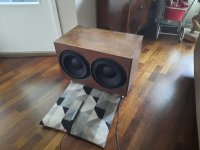

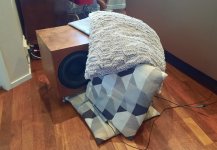
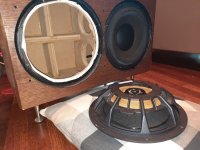
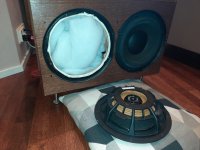
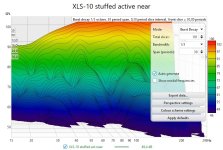
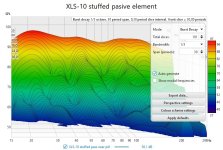
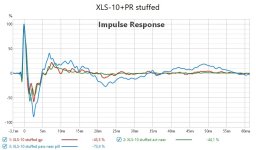
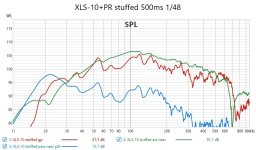
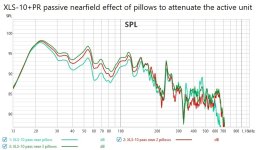
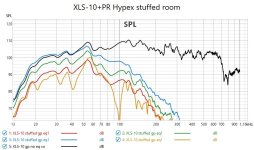

From one graph you can see the effect of using 0 to 3 pillows to block soundwaves from the active unit. Mic was less than 1cm from dustcap in all my nearfield measurements. Spl values from nearfield are not comparable to ground plane, signal level and mic placement varied and in combined graph I lifted gp 10 more dB.
I will not take more measurements, but I can play with REW analysis settings if you ask nicely...











Last edited:
It looks like the the passive radiator conversation will be interesting here.
I have a pair of SB17NBAC35-8 drivers and 4 https://www.parts-express.com/Epiqu...iber-Cone-Passive-Radiator-295-114?quantity=1 passive radiators.
In an attempt to keep the enclosures compact ~ 0.75 Ft^3.
Thoughts?
I have a pair of SB17NBAC35-8 drivers and 4 https://www.parts-express.com/Epiqu...iber-Cone-Passive-Radiator-295-114?quantity=1 passive radiators.
In an attempt to keep the enclosures compact ~ 0.75 Ft^3.
Thoughts?
- Home
- Loudspeakers
- Multi-Way
- Some Interesting Drivers, a New 3-way Project